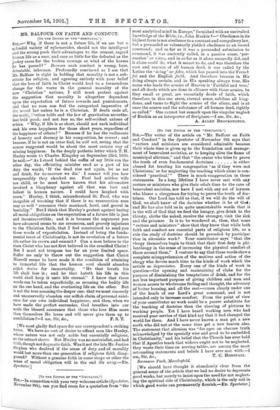(To THE EDITOR OP THE "SPECTATOR. "] Sin,—The writer of the
article on " Mr. Balfour on Faith and Conduct" in the Spectator of November 9th says that " rectors and ministers are considered admirable because their whole time is given up to the foundation and manage- ment of benevolent societies, or to keeping alive the flame of municipal altruism," and that "the orator who tries to prove the truth of even fundamental doctrines is either abused for treating his congregation ' as if they were.. not Christians,' or for neglecting the teaching which alone is con- sidered practical." There is much exaggeration in these statements. In a long lifetime I have never met with any rectors or ministers who give their whole time • to the care of benevolent societies, nor have I met with any set of laymen who blame a clergyman for trying to prove the truth of doc- trines. Our Lord has told us that, if we will do the will of God, we shall know of the doctrine whether it be of God; and He has also told us in quite unmistakable words that it is the will of God that we feed the hungry; give drink to the thirsty, clothe the naked, receive the stranger, visit the sick and the prisoner. Is it to be wondered at, then, that some " rectors and ministers" show that they know that while both faith and conduct are essential parts of religious life, as a rule the study of doctrine should be preceded by participa- tion in altruistic work? Your contributor says "that the clergy themselves begin to think that their first duty is phi- lanthropy in the sense of increasing the physical comfort of those around them." I venture to say that these words shovr a complete misapprehension of the motives and action of the clergy who devote much time to the kinds of work which the article so depreciates. Every one of the kinds of work in question—the opening and maintaining of clubs for the purpose of diminishing the temptations of drink, and for the not less important purpose of giving children and men and women access to wholesome feeling and thought, the advocacy of better housing, and all the rest—comes clearly under one of the heads of our Lord's great command, and is not intended only to increase comfort. From the point of view of your contributor no work could be a poorer substitute for the teaching of doctrine than the showing of pictures to working people. Yet I have heard working men who had received poor service of that kind say that it had changed the world for them. And I have never known a man get a new earth who did not at the same time get a new heaven also. The statement that altruism was "for ages an obscure truth acknowledged by the specially wise and good to be embedded in Christianity," and his belief that the Church has ever held that if Apostles teach that widows ought not to be neglected, they waste their time on serving tables, are among the most astounding statements and beliefs I have ever met with.L-I [We should have thought it abundantly clear from the general sense of the article that we had no desire to.deprecate good works, but merely to insist upon the need for net neglect- ing the spiritual side of Christianity, which is the only soil in which good works can permanently flouriela.—ED. Spectator.]


























































 Previous page
Previous page